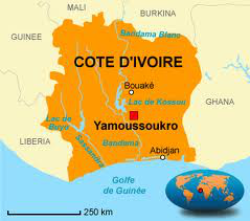A new Director General of the Telecommunications Agency is appointed in Côte d'Ivoire to prepare for the creation of an independent administrative authority.
http://www.thejournalofregulation.com/spip.php?article1440

Economic regulation systems only work if regulators are independent, which implies in a minimal way that they are not corrupt. Few countries meet this basic requirement. Côte d'Ivoire has a telecommunications Agency, which is a State Corporation. By order of March 21, 2012, the Government creates the telecommunications regulatory authority. On May 4, 2012, the Board of Directors of the Agency of telecommunications convened to an extraordinary session and put an end to the mandate of its Director General, because of "serious shortcomings observed in the performance of his duties". He was immediately replaced by a telecommunication engineer, previously technical adviser to the Ministry. He was assigned the mission of preparing the transition of the system to an effectively independent, autonomous and impartial regulator.
© thejournalofregulation
On paper, we don’t know anything about it; nothing resembles anything like a regulatory authority of a country to the one of another country. Moreover, less the country is legally mature and more the authority on paper is splendid. If we take the example of the Côte d’Ivoire discussed here the order of March 21, 2012 endowed the next authority of regulation of telecommunications of the status of an independent administrative authority.
It includes a Council of regulation and a General Management, according to the internal two-sided model (College, General Secretariat) common model. It has the powers to regulate, but the power of sanction and the power of regulation and the power of conflict resolution. But in the reality of things, it is well known that the assertions of independence, fairness, guarantee of prosperity, preservation of foreign investment, etc., are only words, if the realities are in dissonance.
However, few countries have sufficient institutional independence culture that the independent regulators develop easily. It can be considered above all, the Western countries. For others, the culture is different. Regulators, yet required, if for nothing else promoting foreign investment in infrastructure and justifying investment in time despite political instabilities, have difficulty in setting up.
Here we have an example. The example is both the one of the difficulty and also of the reaction, from the country itself, the difficulty, that is to say the end of the mission of the Director (it is truly appointed by interim) and the appointment of a new (which received the signal that the axe may fall if it does not fulfil its mission), with the enactment of a very clear mission and which shouldn’t remain ink on paper: the implementation of an independent regulatory authority.

votre commentaire